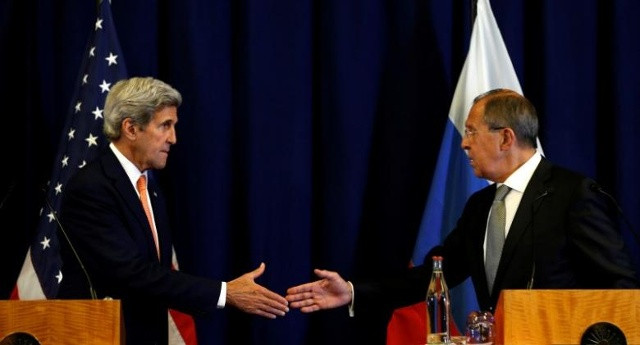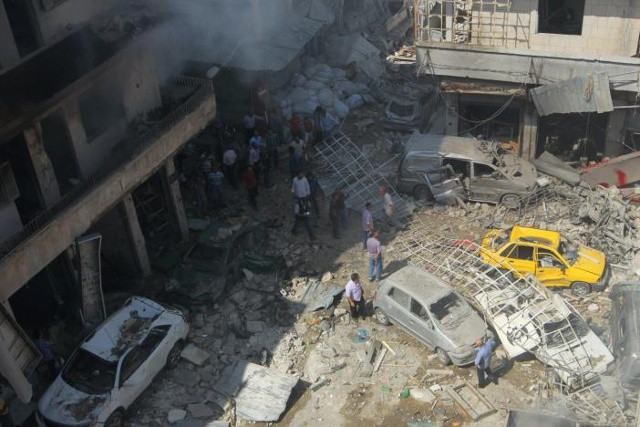Syria Deal: The Pros and Cons
(Baonghean) - Last week's historic agreement between US Secretary of State John Kerry and his Russian counterpart Sergei Lavrov can be seen in many ways as a breakthrough. It is expected to save many innocent lives, and against the backdrop of the most terrible war of the 21st century, it is believed that the agreement is something worth pursuing and striving for.
 |
| US Secretary of State John Kerry and his Russian counterpart Sergei Lavrov. Photo: Reuters. |
The problem lies in the “limited” scope of influence of this nod from many sides. Analysts commented that the ceasefire agreement basically has a certain meaning, but it is still a limited and more tactical agreement. Whether in terms of aid, ceasefire or coordination against radical Islamic groups, neither Washington nor Moscow wants them to become an “eye-sore” part of Syria’s future.
However, it is also necessary to frankly admit that in order to reach the agreement, both senior diplomats of the two superpowers, the US and Russia, seemed to have had to carefully calculate, even intentionally avoid the most difficult and thorny issues. Among these, the number one essential issue, namely the final fate of Syrian President Bashar al-Assad, was not brought to the negotiating table. This omission has received a lot of attention from Damascus, Aleppo and many other regional capitals that play a key role in deciding the outcome of the conflict.
In fact, it is not surprising that the United States and Russia have failed to reach a consensus. Not only in Washington, elites have been unable to agree on what the United States should do. The same cannot be said for Europe, which is expressing its concern about the political consequences of a flood of migrants pouring into their territories. There, while many countries are struggling to find concrete solutions, there are also many countries that want the Syrian war to come to a quick end, at any cost.
In the United States, a group of State Department officials have urged Washington to take cautious military action against forces supporting the Assad regime in Syria. Not because they believe Assad can be toppled, but because they believe his actions over the past five years—including last month’s reported chemical attacks—deserve a more punitive response.
 |
| People in Aleppo, Syria receive food aid. Photo: Reuters. |
Others, including many liberal and neoconservative voices, argue that this approach is unrealistic, insisting that undermining the Syrian government’s ability to maintain control will only worsen an already dire situation and make the long-term reconstruction of Syria more difficult, whether under a new government or with Mr. Assad still in power.
Washington is unlikely to resolve this issue before the presidential election in November. And so, whoever wins and becomes the owner of the White House will have to build a strategy that factors in current developments in Syria, including war zones like Aleppo.
That is where joint US-Russian coordination against radical Islamist groups is likely to have a real impact. It would make sense on several levels. First, most regional and international powers and local forces are essentially on the same side. They all want the self-proclaimed Islamic State (IS) to go away, though the idea of what will replace IS is still up for debate.
When Russian, American and other aircraft operate in the same area, there must be strict systems in place to prevent accidental confrontation. So far, Moscow and Washington have been quite effective there, even though the Syrian Air Force has occasionally tried its luck by conducting airstrikes near where US special operations forces are working with moderate rebels, according to Reuters.
 |
| Syria's Idlib city devastated after airstrikes. Photo: Reuters. |
Another issue to note is that there are many more parties to the Syrian war than Russia and the United States. Both Iran, which supports Assad, and the Sunni Muslim powers that support the opposition have their own views and arguments. And by sending its military forces to Syria, Türkiye is becoming a player in shaping the conflict in ways that go beyond the top priorities of Kerry, Lavrov, Obama, and Putin.
Since Turkish President Tayyip Erdogan crushed a coup attempt in July, he has clearly lost the sense of being beholden to any foreign power when it comes to shaping policy. After recent IS attacks on its territory, Ankara is apparently as eager to push back against the group as Washington is.
One day, the Syrian war may come to an end through an internationally negotiated agreement. The Kerry-Lavrov agreement could then be seen as one of the building blocks for that future. But for now, it simply opens the door to a new chapter in the ongoing conflict.
Phu Binh
(According to Reuters)
| RELATED NEWS |
|---|




